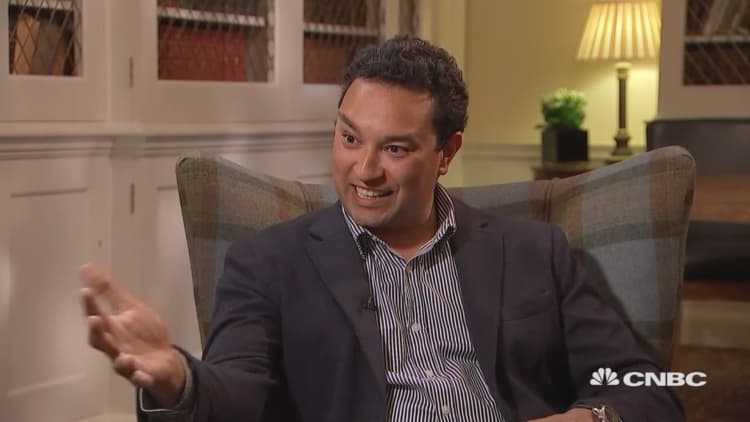When Dutch payments processing firm Adyen went public on June 13, the stock jumped 100 percent above the initial share price, giving the company a valuation of 14.8 billion euros ($17 billion). Adyen's spectacular entry into the elite ranks of unicorns — companies valued at more than $1 billion — was all the more noticeable because it was a European company.
For years Europe has had a reputation of nurturing tech start-ups that couldn't grow big enough to reach the billion-dollar mark. But 2018 may be the year that finally puts this stigma to rest. A series of billion-dollar European companies have staged successful IPOs or are planning to list this year on exchanges from London to Sydney.
So far this year, 27 IPOs totaling $32.5 billion have been launched in Europe, eclipsing the 57 listings worth $8.28 billion last year, according to dealroom.co, an Amsterdam firm that tracks fast-growing companies. The big difference this year is not the number of listings, which has been fairly steady in recent years, but the size of the valuations of the companies. "There is a clear emergence of unicorns after a few years of increasing investment in the venture capital sector," said Gilles Babinet, a French serial entrepreneur.
This year's string of big-value European IPOs started with Spotify's listing in April. The music streaming company, based in Stockholm, offered an unusually small proportion of its shares at a valuation of $29 billion. Then Avast, a Czech cybersecurity group with CVC Capital Partners and Summit partners as investors, went public on May 10 at a valuation of $2.7 billion. Swedish digital payments firm Izettle should have been the next head-turner for investors, but PayPal swooped in with an offer of $2.2 billion — twice the IPO value.
More from Global Investing Hot Spots:
How Italian turmoil could spark a domino effect in Europe
The women leading the multibillion-dollar investment revolution
More potential unicorns are in the queue. Funding Circle, an alternative lender, and luxury fashion site Farfetch, both based in London, are widely expected to announce IPOs this year. Funding Circle's blue chip investors include Index Ventures and Accel Partners, and the start-up could be valued at $2 billion. CNBC reported earlier that Farfetch could reach a valuation of $6 billion. Its investors include France's Eurazeo and Singapore's sovereign wealth fund Temasek.

Dealroom.co published a list of 32 European companies that qualify as unicorns. "There is a wave of venture-capital companies reaching maturity," said Yoram Wijngaarde, founder of dealroom.co. "It's the result of investments made in the last five to 10 years." His firm estimates that as many as 485 smaller European tech companies with valuations of 200 million euros ($232 million) or more could eventually reach unicorn status.
But it's not just the unicorns that are crowding the European IPO market. While the billion-dollar listings get the most attention, a steady stream of smaller European companies has gone to the public markets in recent years. For example, German online furniture retailer Home24, with 41 percent of its shares held by e-commerce investor Rocket Internet, listed on the Frankfurt stock exchange on June 15, falling just short of unicorn status. First-day trading lifted the shares nearly 30 percent, giving it a valuation of $907 million.
According to start-up tracker Tech.eu, other potential IPOs this year could come from Marley Spoon, a German meal-kit provider that has decided to list in Australia because of its strong presence in the market and Nayva, a French manufacturer of autonomous shuttle vehicles backed by both public and private funds, including Robolution Capital, which invests in robotics and AI.
"Since 2014, Europe has seen more tech IPOs than the United States, indeed almost twice as many in both 2016 and 2017," said James Clark, head of tech and life sciences, primary markets, for the London Stock Exchange. "This period saw the IPOs of big names — Worldpay, Rocket Internet, Just Eat, Rovio, Delivery Hero and Zoopla."
Data from Atomico, an investment firm founded by Skype co-founder Niklas Zennström, shows 46 European IPOs in 2016 vs. 20 in the United States and 63 vs. 32 in 2017. "The question of whether Europe can produce world-class innovation has been put to bed," wrote Tom Wehmeier, partner and head of research at Atomico in its "State of European Tech" report.
The amount of venture money available in Europe has also risen steadily. In 2017, VC firms invested $19.1 billion, up 33 percent from 2016, according to data from dealroom.co. With plenty of venture money feeding the momentum and the markets running full tilt, Europe should remain a fertile market for start-ups, IPOs and the not-so-rare unicorn sightings.





